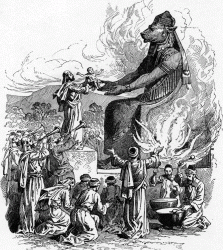- Details
-
Category: A Hell of a Question
Pagan ideas of a fiery netherworld date back as far as Egypt's Nimrod. Way before Christ, in the 6th century BC, Zoroaster taught the Persians of a Lord of Lies who lived in the dark reaches under the earth recording the deeds of men as debits and credits. After death, souls went to be judged, and if found evil, would be doomed to torment. To easily win pagan converts, the church adopted these theories and began relating Zoroastic meanings to symbolic verses. Apostle Paul predicted such distortions (apostasy) would occur (Acts 20:29-30).
Read more: A History of What the Hell!
- Details
-
Category: A Hell of a Question
Where are the dead at present? Is there any hope for them? There is a hell – SHEOL/HADES to which ALL our souls were condemned when Adam fell. That hell is the GRAVE. But there is hope! God promised to RANSOM us from the power of the grave [SHEOL] (Hosea 13:14). He sent Jesus (John 3:16) to die in place of Adam. Jesus paid Adam’s RANSOM and paved the way for the resurrection of all of Adam (Rom 5:12,18). Jesus is the RANSOM for ALL (1Tim 2:6). As in Adam ALL die, so in Christ ALL will be made alive (1Cor 15:22).
Read more: Fate of Adam & the Bad Guys
- Details
-
Category: A Hell of a Question
Won’t it be alright to use hell fire (even if it’s false) as a threat to frighten people into submitting to God? Not really. A disappointed God says, ‘Their fear toward me is taught by the precepts of men’ (Isa 29:13). He rather desires a willingly obedient heart driven by love for Him and goodness - not by fear. And the idea of torment is abhorrent to God. God forbade torture in His Law. Would a God who commands us to love our enemies, wish to burn them forever?
Read more: A Hell of a Story
- Details
-
Category: A Hell of a Question
Four words have been translated as hell in the Bible – Sheol, Hades, Gehenna and Tartaroo. The first one is Hebrew (Old Testament) and the rest are Greek (New Testament). Do all of these words mean the same? (At least that's what many of the English bible translations imply). Or do they mean different things?
When we refer to Hebrew and Greek dictionaries and the Bible's own descriptions of these words, we find deeper insight into their meanings.
And we also get clarity on many seemingly contradictory verses in the English bibles.
Read more: The Real 'Hells'

